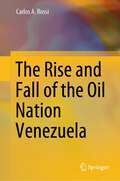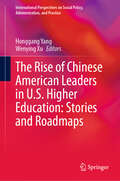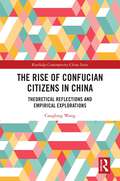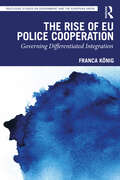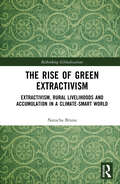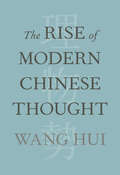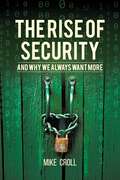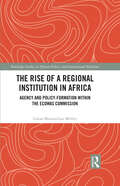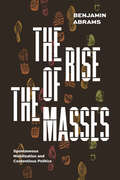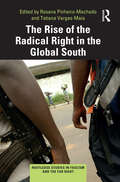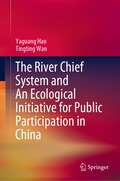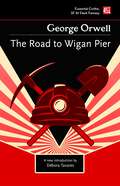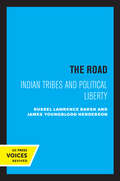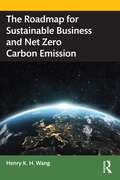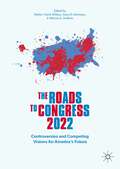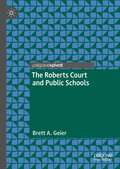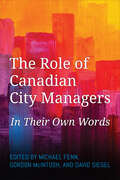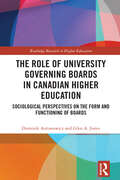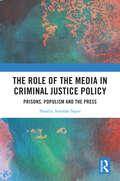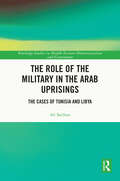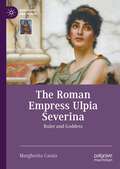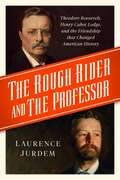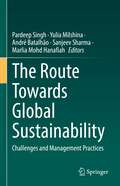- Table View
- List View
The Rise and Fall of the Oil Nation Venezuela
by Carlos A. RossiThis book explains why Venezuela is so rich in natural resources—it has been producing oil since 1922 and harbors the largest oil reserves in the world—and yet it is also a failed nation of class-divided citizens exhibiting deep poverty in a corrupt, incompetent state. Venezuela is a bipolar nation, where two marked poles in the society exist which have historical origins and are mutually exclusive.The book provides a critical analysis of Venezuela's history, economy and politics and explains the context and implications of the bipolar poles, known as the elite pole and the resentful pole. Both, it shows, have done serious harm to Venezuela’s prosperity.The author describes the vicious circle of oil wealth, corruption, inefficiency and world market dependency and gives recommendations for a better future.
The Rise of Chinese American Leaders in U.S. Higher Education: Stories and Roadmaps (International Perspectives on Social Policy, Administration, and Practice)
by Wenying Xu Honggang YangThis book is a collection of stories and reflections that represent Chinese American leaders and depict their tortuous journeys in U.S. higher education that comes at a critical point in time. Many books have been devoted to academic leadership, but this volume uniquely focuses on subjects most relevant to Chinese Americans. We live at a time that not only witnesses an increase in Chinese American leaders on U.S. campuses but also mounting incidents of discriminatory treatment of this group. This book showcases 36 stories and reflections from past, present, and future leaders, including the five previously published stories. They represent leaders holding different ideological values in various academic fields, positions, stages of careers, professional trajectories, generations, Chinese ethnic groups, and geographical locations. The Rise of Chinese American Leaders in U.S. Higher Education makes a valuable contribution to the body of literature that has assisted countless academic leaders in navigating their careers, bringing to the forefront a distinct group of academic leaders who have been underrepresented.
The Rise of Confucian Citizens in China: Theoretical Reflections and Empirical Explorations (Routledge Contemporary China Series)
by Canglong WangThis book explores the relationship between Confucianism and citizenship and the rise of Confucian citizens in contemporary China. Combining theoretical and empirical approaches to the topic, the book constructs new frameworks to examine the nuances and complexities of Confucianism and citizenship, exploring the process of citizen-making through Confucian education. By re-evaluating the concept of citizenship as a Western construct and therefore challenging the popular characterization of Confucianism and citizenship as incompatible, this book posits that a new type of citizen, the Confucian citizen, is on the rise in 21st-century China. The book’s clear, accessible style makes it essential reading for students and scholars interested in citizenship, Confucianism and Chinese studies, and those with an interest in religion and philosophy more generally.
The Rise of EU Police Cooperation: Governing Differentiated Integration (Routledge Studies on Government and the European Union)
by Franca KönigThis book provides an in-depth empirical analysis and theoretical history of the institutional development of EU police cooperation, with a focus on the creation and integration of Europol. Presenting a thoroughly comprehensive analysis, the book systematically traces integration dynamics and the evolution of EU police cooperation over a 40-year period, assessing the influence of cross-country interdependencies, politicisation and policy entrepreneurship on Member States’ behaviour and institutional choice. By combining a wealth of sources including previously unpublished sources and personal insights from key decision-makers, it explores which driving factors shape processes of differentiation and integration in this sovereignty-sensitive policy domain, and how, and attempts to explain state preferences on international police cooperation in the light of major theories of European integration. The book will be of key interest to students, scholars and practitioners working in or on the fields of police cooperation, Justice and Home Affairs policy, EU governance and security studies, both at national and European level.
The Rise of Green Extractivism: Extractivism, Rural Livelihoods and Accumulation in a Climate-Smart World (Rethinking Globalizations)
by Natacha BrunaThe Rise of Green Extractivism tackles the understudied interconnections between extractivism and climate-smart policies and their implications for rural livelihoods, both theoretically and empirically. This new variation of extractivism arises as an innovative way in which capitalist production and accumulation unfolds and constitutes a convenient analytical tool in today's focus on reducing or compensating for emissions. The book consolidates 'extractivism' as a theoretical framework that fully challenges contemporary capitalism’s dynamics, particularly in the current global environmental crisis. It explores new dynamics of accumulation, resource grabbing and legitimation strategies. These are approached as mechanisms of appropriation of resources that produce social, economic and ecological implications to be considered in the current agrarian question debates. By analysing the implementation and outcomes of green policies, the author shows that new strategies of capital accumulation arise through the creation of new commodities, markets, vehicles of accumulation and ways of legitimising capital accumulation. A new and 'greener' frontier of accumulation is constituted. These emerging processes of commodification bring along new waves of expropriation that further cut into the necessary consumption of rural populations. Insights from empirical cases explored in this book show how this new wave of green investments and projects, directly linked to climate change concerns, are further expropriating livelihoods and fuelling capital accumulation in the name of the fight against climate change. This book will be of great interest to students, scholars and researchers of political economy, globalisation, development studies, economics, political ecology, agrarian studies and environmental studies. It will also inform and provide policymakers with evidence-based insights into their decision-making process when designing and implementing climate change mitigation and adaptation policies, especially in developing countries.
The Rise of Modern Chinese Thought (Emersion: Emergent Village Resources For Communities Of Faith Ser.)
by Hui WangThe definitive history of China’s philosophical confrontation with modernity, available for the first time in English.What does it mean for China to be modern, or for modernity to be Chinese? How is the notion of historical rupture—a fundamental distinction between tradition and modernity—compatible or not with the history of Chinese thought?These questions animate The Rise of Modern Chinese Thought, a sprawling intellectual history considered one of the most significant achievements of modern Chinese scholarship, available here in English for the first time. Wang Hui traces the seventh-century origins of three key ideas—“principle” (li), “things” (wu), and “propensity” (shi)—and analyzes their continual evolution up to the beginning of the twentieth century. Confucian scholars grappled with the problem of linking transcendental law to the material world, thought to action—a goal that Wang argues became outdated as China’s socioeconomic conditions were radically transformed during the Song Dynasty. Wang shows how the epistemic shifts of that time period produced a new intellectual framework that has proven both durable and malleable, influencing generations of philosophers and even China’s transformation from empire to nation-state in the early twentieth century. In a new preface, Wang also reflects on responses to his book since its original publication in Chinese.With theoretical rigor and uncommon insight into the roots of contemporary political commitments, Wang delivers a masterpiece of scholarship that is overdue in translation. Through deep readings of key figures and classical texts, The Rise of Modern Chinese Thought provides an account of Chinese philosophy and history that will transform our understanding of the modern not only in China but around the world.
The Rise of Security and Why We Always Want More
by Mike CrollSecurity is now a $500 billion global business, and it`s growing fast. It's developed from the night watchman keeping a sleepy eye out, to the guard patrolling the shopping mall, to smart surveillance systems monitoring everything, everywhere,
The Rise of a Regional Institution in Africa: Agency and Policy-Formation within the ECOWAS Commission (Routledge Studies in African Politics and International Relations)
by Lukas Maximilian MüllerThis book focuses on the ECOWAS Commission, both as an autonomous actor, as well as a policy-making nexus for its member states and external actors. Drawing from a variety of never-before analyzed sources, unpublished internal documents and over 120 interviews with staff from the ECOWAS Commission, its member states, and external actors supporting the organization, this book presents a comprehensive portrait of ECOWAS’s institutional capabilities, challenges, and reforms. It utilizes a policy studies approach focusing on the areas of political affairs, peace, and regional security, as well as trade and customs to illustrate concrete cases of policy making. In doing so, the book provides practice-oriented insights into the policy-making agency within the organization, arguing for the significance of the ECOWAS Commission as an actor. This book will be of interest to scholars and students of West Africa and its international relations, comparative regionalism, international organization studies, development studies, policy-making, peace and conflict studies, governance and more broadly to African politics and international relations.
The Rise of the Masses: Spontaneous Mobilization and Contentious Politics
by Benjamin AbramsAn insightful examination of how intersecting individual motivations and social structures mobilize spontaneous mass protests. Between 15 and 26 million Americans participated in protests surrounding the murders of George Floyd, Ahmaud Arbery, Breonna Taylor, and others as part of the Black Lives Matter protests in 2020, which is only one of the most recent examples of an immense mobilization of citizens around a cause. In The Rise of the Masses, sociologist Benjamin Abrams addresses why and how people spontaneously protest, riot, and revolt en masse. While most uprisings of such a scale require tremendous resources and organizing, this book focuses on cases where people with no connection to organized movements take to the streets, largely of their own accord. Looking to the Arab Spring, Occupy Wall Street, and the Black Lives Uprising, as well as the historical case of the French Revolution, Abrams lays out a theory of how and why massive mobilizations arise without the large-scale planning that usually goes into staging protests. Analyzing a breadth of historical and regional cases that provide insight into mass collective behavior, Abrams draws on first-person interviews and archival sources to argue that people organically mobilize when a movement speaks to their pre-existing dispositions and when structural and social conditions make it easier to get involved—what Abrams terms affinity-convergence theory. Shedding a light on the drivers behind large spontaneous protests, The Rise of the Masses offers a significant theory that could help predict movements to come.
The Rise of the Masses: Spontaneous Mobilization and Contentious Politics
by Benjamin AbramsAn insightful examination of how intersecting individual motivations and social structures mobilize spontaneous mass protests. Between 15 and 26 million Americans participated in protests surrounding the murders of George Floyd, Ahmaud Arbery, Breonna Taylor, and others as part of the Black Lives Matter protests in 2020, which is only one of the most recent examples of an immense mobilization of citizens around a cause. In The Rise of the Masses, sociologist Benjamin Abrams addresses why and how people spontaneously protest, riot, and revolt en masse. While most uprisings of such a scale require tremendous resources and organizing, this book focuses on cases where people with no connection to organized movements take to the streets, largely of their own accord. Looking to the Arab Spring, Occupy Wall Street, and the Black Lives Uprising, as well as the historical case of the French Revolution, Abrams lays out a theory of how and why massive mobilizations arise without the large-scale planning that usually goes into staging protests. ? Analyzing a breadth of historical and regional cases that provide insight into mass collective behavior, Abrams draws on first-person interviews and archival sources to argue that people organically mobilize when a movement speaks to their pre-existing dispositions and when structural and social conditions make it easier to get involved—what Abrams terms affinity-convergence theory. Shedding a light on the drivers behind large spontaneous protests, The Rise of the Masses offers a significant theory that could help predict movements to come.
The Rise of the Radical Right in the Global South (Routledge Studies in Fascism and the Far Right)
by Rosana Pinheiro-Machado Tatiana Vargas-MaiaThe Rise of the Radical Right in the Global South is the first academic study—adopting an interdisciplinary and international perspective—to offer a comprehensive and groundbreaking framework for understanding the emergence and consolidation of different radical-right movements in Global South countries in the twenty-first century. From deforestation and the anti-vaccine movement in Bolsonaro’s Brazil to the massacre of religious minorities in Modi’s India, the rise of the radical right in the Global South is in the news every day. Not long ago, some of these countries were globally celebrated as emerging economies that consolidated vibrant democracies. Nonetheless, they never overcame structural problems including economic inequality, social violence, cultural conservatism, and political authoritarianism. Featuring case studies from Brazil, India, the Philippines, and South Africa, and more generally from Africa and Latin America, this book analyses future scenarios and current alternatives to this political movement to the radical right. It proposes a shift of focus in examining such a trend, adopting a view from the Global South; conventional theoretical tools developed around the experience in Global North countries are not enough. The authors show that the radical right in the Global South should be analysed through specific lenses, considering national historical patterns of political and economic development and instability. They also warn that researching these countries may differ from contexts where democratic institutions are more reliable. This does not mean abandoning a transnational understanding of the radical right; rather, it calls for the opposite: the chapters examine how the radical right is invented, adapted, modified, and resisted in specific regions of the globe. This volume will be of interest to all those researching the radical right and the politics of development and the Global South.
The River Chief System and An Ecological Initiative for Public Participation in China
by Yaguang Hao Tingting WanThis book provides an alternative agenda to deepening the understanding of the River Chief System as a distinctive responsibility approach to solve water pollution and associated governance dilemmas. Insightful analysis is performed through in-depth studies of the origins of China’s River Chief System, responsibility mechanisms, governmental and civil river chiefs, formal and informal water governing institutions, public participation, empowerment with accountability, and the environmental impact.
The Road to Wigan Pier (Essential Gothic, SF & Dark Fantasy)
by George OrwellA new edition of Orwell's early work, showing the origins of his commitment to social justice.A new edition of Orwell's early account of bleak working class life in the industrial culture of Yorkshire and Lancashire, which revealed the distinctions between the upper classes of the British Empire and the reality of the people who worked in the factories to drive wealth and prosperity for others, never to get a share for themselves. Published while Orwell was in Spain, the book highlights the political philosophy that led him to fight for the leftist forces in the Civil War.
The Road: Indian Tribes and Political Liberty
by James Youngblood Henderson Russell Lawrence BarshThis title is part of UC Press's Voices Revived program, which commemorates University of California Press’s mission to seek out and cultivate the brightest minds and give them voice, reach, and impact. Drawing on a backlist dating to 1893, Voices Revived makes high-quality, peer-reviewed scholarship accessible once again using print-on-demand technology. This title was originally published in 1980.
The Roadmap for Sustainable Business and Net Zero Carbon Emission
by Henry K. WangWhat does sustainable business and net zero carbon emission mean for businesses globally? How should companies globally transform into sustainable businesses with net zero carbon emissions? This book unpacks the institutional, organisational and management challenges in pursuing sustainable business and carbon neutrality for businesses. In this book, Henry K. H. Wang, an internationally recognised Climate and Business expert, provides real-life cases across different countries and business sectors. He outlines potential policy implications and strategy options for companies to consider in their transitions to sustainable business practices. He also explores important new global developments in smart cities, green transport and carbon solutions, and how the adoption of sustainable finance and green investments can accelerate businesses transformation. This book will appeal to anyone interested to learn more about the successful planning and execution of sustainable business and net zero carbon neutrality transformations.
The Roads to Congress 2022: Controversies and Competing Visions for America's Future
by Walter Clark Wilson Sean D. Foreman Marcia L. GodwinThis book analyzes both local and national House and Senate campaigns in the 2022 midterm elections to reveal how distinctive campaign dynamics have a collective national impact. Despite serious efforts to overturn the results of the 2020 presidential race that went mostly unopposed by Republicans, the GOP is poised to gain seats, and perhaps control of Congress less than two years later. Their efforts to accomplish this feat may be explained by the biannual pattern of surging and declining partisan electorates that political scientists have long used to explain election outcomes. But in an era where global pandemic lingers, inflation hit its highest rate in two generations, Wall Street faces its first bear market in more than a decade, war among developed nations has returned to the international stage, and efforts by a former President to maintain his grip on a party that lost the 2020 popular vote by 9 million proved largely successful, the story is clearly more complicated. The 2022 midterms thus arrive on the heels of unprecedented developments for democracy in America. The Roads to Congress 2022 provides an essential guide to understanding these developments, with thematic chapters authored by more than thirty experts in campaigns and elections that explore the evolving state of party politics, electoral governance, redistricting, participation and representation, and profile the key races of the season.
The Roberts Court and Public Schools
by Brett A. GeierThis unique and timely book offers a synthesis, analysis, and evaluation of education-related rulings of the US Supreme Court from 2005 to the present. Throughout the course of the twentieth century into the twenty-first century, the Supreme Court issued rulings, which frequently vacillate based on the political composition of the justices who sit on the bench. Chapters will cover both an overview of the role of Supreme Court rulings in school policy and the court’s transformation in the late twentieth century into the present day. These themes will be converted into robust chapters which will provide a legal analysis of the Roberts Court years, and an evaluation of the jurisprudence and its practical effect on public schools.
The Role of Canadian City Managers: In Their Own Words
by David Siegel Michael Fenn Gordon McintoshLocal government has rapidly become both more important and more complex and the quality of municipal management is becoming more significant every day as local governments deal with a vast array of organizational and community challenges. The Role of Canadian City Managers brings together experienced city managers and municipal chief administrative officers (CAOs) across Canada to analyse the daily issues that they face. Each chapter deals with a particular issue or challenge, such as council/staff relations, collaborative initiatives, and crisis readiness. The book contributes to the literature on local government and public administration by providing insights from the "real time" lived experiences of city managers, spoken in their own words. The book also speculates about the contemporary leadership role of the city manager and the future of the city management profession. The Role of Canadian City Managers is a useful resource for scholars and students of local government and public administration, as well as public servants who work with or aspire to leadership roles within local government.
The Role of Design, Construction, and Real Estate in Advancing the Sustainable Development Goals (Sustainable Development Goals Series)
by Thomas Walker Sherif Goubran Carmela Cucuzzella Rana GeithThis edited book brings together insights from scholars and practitioners from many different fields to uncover the role of the construction and real estate sectors and how they align with the Sustainable Development Goals (SDGs). It follows a lifecycle-based approach to the topic, addressing the design, construction, management, investment, and regulatory dimensions of projects in the area. It expands the reader’s understanding of the built environment beyond the design and construction phases, which enables the collection to explore the links and transitions between different project phases and uncover new methodologies that aim to tackle systemic sustainable development challenges. The chapters’ comprehensive coverage allows the collection to capitalize on the strengths and weaknesses of the building industry, highlight emerging trends, and uncover some critical gaps that need to be addressed to attain the 2030 vision. This puts into perspective the interconnected nature of the SDGs and highlights the importance of multi-stakeholder collaborations in achieving them.
The Role of University Governing Boards in Canadian Higher Education: Sociological Perspectives on the Form and Functioning of Boards (Routledge Research in Higher Education)
by Glen A. Jones Dominik AntonowiczThis book explores the historical and social foundations of Canadian higher education and provides a detailed analysis of university boards within this broader context of university governance. By examining rich empirical data from a sociological perspective, it offers unique insights into the role of boards, and the structures and practices that frame their work. It explores board composition, the professional backgrounds of board members, how members perceive their role, and the complex relationships between the board and the university president. The authors also compare and contrast the Canadian experience with governance reforms in Europe and other regions over recent decades. Drawing on multiple theoretical perspectives, the authors provide a nuanced analysis of the role of boards in terms of oversight, protecting university autonomy, representing societal interests, and dealing with increasing complexity and expectations. This innovative, original study makes an enormous contribution to our understanding of the role and work of Canadian university boards, and to international scholarship on higher education governance. It will appeal to scholars and researchers with interests across higher education, international and comparative education, and the sociology of education.
The Role of the Media in Criminal Justice Policy: Prisons, Populism and the Press
by Natalia Antolak-SaperThis book provides a socio-legal examination of the media’s influence on the development and implementation of criminal justice policy. This impact is often assumed. And, especially in the wake of high-profile crimes, the press is routinely observed calling for sentences to be harsher, and for governments to be tougher on crime. But how do we know that there is a connection? To answer this question, the book draws on a case study of the media reporting of the rape and murder of Jill Meagher in Melbourne, Australia; as well as other well-known cases, including those of James Bulger, Sarah Payne, Stephen Lawrence and Michael Brown, among others. Deploying a socio-legal framework to examine how the media’s often powerful and emotive narratives play a crucial role in the development and implementation of law, the book provides a deep and critical reflection on its influence. The book concludes with a number of suggestions for media reform: both to moderate the media’s influence, and to incorporate a broader range of viewpoints. This multi-disciplinary book will appeal to scholars and students in sociolegal studies, criminology and criminal law as well as those working in relevant areas in sociology and media studies.
The Role of the Military in the Arab Uprisings: The Cases of Tunisia and Libya (Routledge Studies in Middle Eastern Democratization and Government)
by Ali SarihanFocused on the 2010-2011 Arab Uprisings, this book examines the role of the military in Tunisia and Libya, arguing that both armies contributed decisively to the outcome and form of the respective uprisings. The book begins by contextualizing the uprisings, with both countries plagued by anti-democratic politics and unequal social and economic structures in the 2000s. Alongside this, the book explores the key actors and factors leading up to, during, and after the uprisings. Employing a comparative case study methodology and drawing from approaches in rational choice theory and institutionalism, the author argues that the tripartite configuration of energy capacity, military structure, and strength of protest led to dichotomous outcomes in the countries. Tunisia, where the military defected, was marked by a lack of energy wealth, apolitical military structure, and high level of protest, enabling a nonviolent transfer of power. In contrast, in Libya, where parts of the military remained loyal to Gaddafi’s regime, protests evolved into violent civil conflict. Making use of expert and elite interviews obtained from fieldwork in Tunisia, as well as data from the research field, the book will appeal to specialists and students interested in international politics, military and security studies, and the MENA region.
The Roman Empress Ulpia Severina: Ruler and Goddess (Queenship and Power)
by Margherita CassiaOf the twelve Augustae who lived during the fifty years of the so-called “military anarchy” (235-284 A.D.), Ulpia Severina, wife of the “Illyrian” emperor Aurelian (270-275 AD), is certainly one of the most enigmatic and less known. The book focuses on Ulpia Severina, who, even though never mentioned by name in literary sources, has been studied almost exclusively from the perspective of the numerous coins issued in her name and is the subject of many interesting honorific inscriptions that had not been thoroughly examined or adequately valued until this study. This exceptional situation, represented by the sole presence of Ulpia Severina on the throne of Rome, deserves more attention than it has received. The pages of the university history textbooks dedicated to the reconstruction of a fifty-year phase of Roman-imperial history must be, if not rewritten, at least integrated in order to give the deserved space to this empress and, therefore, to the so-called “interregnum,” which lasted at least two months, between the death of Aurelian and the advent of emperor Tacitus.
The Rough Rider and the Professor: Theodore Roosevelt, Henry Cabot Lodge, and the Friendship that Changed American History
by Laurence JurdemEvoking the political intrigue of the Gilded Age, The Rough Rider and the Professor chronicles the extraordinary thirty-five-year friendship between President Theodore Roosevelt and Senator Henry Cabot Lodge of Massachusetts.Theodore Roosevelt was a uniquely gifted figure. A man of great intellect and physicality, the New York patrician captured the imagination of the American people with his engaging personality and determination to give all citizens regardless of race, color, or creed the opportunity to achieve the American dream. While Roosevelt employed his abilities to rise from unknown New York legislator to become the youngest man ever to assume the presidency in 1901, that rapid success would not have occurred without the assistance of the powerful New Englander, Henry Cabot Lodge. Eight years older than Roosevelt, from a prominent Massachusetts family, Lodge, was one of the most calculating, combative politicians of his age. From 1884 to 1919 Lodge and Roosevelt encouraged one another to mine the greatness that lay within each of them. As both men climbed the ladders of power, Lodge, focused on dominating the political landscape of Massachusetts, served as the future president&’s confidant and mentor, advising him on political strategy while helping him obtain positions in government that would eventually lead to the White House. Despite the love and respect that existed between the two men, their relationship eventually came under strain. Following Roosevelt's ascension to the presidency, T. R.&’s desire to expand the social safety net—while attempting to broaden the appeal of the Republican Party—clashed with his older friend's more conservative, partisan point of view. Those tensions finally culminated in 1912. Lodge's refusal to support the former president's independent bid for a third presidential term led to a political break-up that was only repaired by each man's hatred for the policies of Woodrow Wilson. Despite their political disagreements, Theodore Roosevelt and Henry Cabot Lodge remained devoted friends until the Rough Rider took his final breath on January 6, 1919.
The Route Towards Global Sustainability: Challenges and Management Practices
by Sanjeev Sharma Pardeep Singh Yulia Milshina Marlia Mohd Hanafiah André BatalhãoThis volume discusses topics of global sustainability involving sustainability indicators, stakeholders' participation, and technological and strategic advances with the goal of "thinking locally to act globally". Scientists, academics, policymakers, and planners are currently focused on escalating global socioeconomic and ecological issues, such as rising inequality, adverse anthropogenic impacts on the environment, and deficiencies in natural resources. These variables are pushing the earth system's resistance capacity past its breaking point, with additional pressures incurred by a global pandemic. Therefore, this book looks to impart knowledge on participatory learning action research for human and environmental health and well-being. Sustainable development planning and management are needed in these pressing circumstances, and they necessitate an analytical interpretation of ongoing processes, current and future challenges, and an understanding of available tools and technologies. The main sections of the book focus on challenges and management practices for global sustainability, promoting educational values, smart initiatives in urban contexts, and integrating emerging sustainability dimensions in policies and legislation. The primary audience for the work is policy makers, urban planners, social scientists, economists, NGOs, and students, researchers, and educators engaged in environmental social science and sustainability management.
